
FACULTY OF ARTS AND SCIENCES
Department of English Translation and Interpreting
FR 321 | Course Introduction and Application Information
| Course Name |
French Language for English Translation and Interpreting V
|
|
Code
|
Semester
|
Theory
(hour/week) |
Application/Lab
(hour/week) |
Local Credits
|
ECTS
|
|
FR 321
|
Fall/Spring
|
2
|
2
|
3
|
4
|
| Prerequisites |
|
|||||||
| Course Language |
French
|
|||||||
| Course Type |
Second Foreign Language
|
|||||||
| Course Level |
First Cycle
|
|||||||
| Mode of Delivery | - | |||||||
| Teaching Methods and Techniques of the Course | Group WorkRole PlayingLecture / Presentation | |||||||
| Course Coordinator | ||||||||
| Course Lecturer(s) | ||||||||
| Assistant(s) | - | |||||||
| Course Objectives | The aim of this course is to make students, who are Basic Users in the scope of Common European Framework of Reference, achieve B1.1 level, which is named as threshold. |
| Learning Outcomes |
The students who succeeded in this course;
|
| Course Description | This course is designed to prepare students for give information about giving or participating in speeches, business environment, working company, contacts and quality, friendship, deferred work, to-do list, choices. |
|
|
Core Courses | |
| Major Area Courses | ||
| Supportive Courses | ||
| Media and Management Skills Courses | ||
| Transferable Skill Courses |
WEEKLY SUBJECTS AND RELATED PREPARATION STUDIES
| Week | Subjects | Related Preparation |
| 1 | Introduction of the FR 321 course | |
| 2 | Allow someone to speak during a conversation. Give advice. Rules to follow when speaking publicly | L’atelier B1, Méthode de français, Unit 1, Situation 1, pages : 18-19 |
| 3 | Telling an app. Explaining a trend. Structures that need to be used when explaining. Talking about podcast trends | L’atelier B1, Méthode de français, Unit 1, Situation 2, pages : 20-23 |
| 4 | Talking about a relationship. Talking about friendship. How do real relationships, friendships, occur? | L’atelier B1, Méthode de français, Unit 1, Situation 3, pages : 24-27 |
| 5 | Preparation for the DELF B1 exam. Examples of reading and oral | L’atelier B1, Cahier d’activités, Unit 1, DELF B1, pages : 16-17 |
| 6 | To promote a company. Explaining your opinion of the business world. Describing a job | L’atelier B1, Méthode de français, Unit 2, Situation 1, pages : 34-35 |
| 7 | Depicting a photo, talking about the photo. Talking about the business environment. Midterm exam | L’atelier B1, Méthode de français, Unit 2, Situation 2, pages : 36-39 |
| 8 | Talking about clichés. Clichés in different business areas. Talking about your profession and experiences | L’atelier B1, Méthode de français, Unit 2, Situation 3, pages : 40-43 |
| 9 | Preparation for the DELF B1 exam. Examples of reading and writing | L’atelier B1, Cahier d’activités, Unit 2, DELF B1, pages : 28-29 |
| 10 | Choosing to slow down; slow down the flow of life. Choosing to laugh. Structures used to express selections | L’atelier B1, Méthode de français, Unit 3, Situation 1, pages : 50-51 |
| 11 | To prepare a plan of action. The tendency to put things off. Create a to-do list, organizing | L’atelier B1, Méthode de français, Unit 3, Situation 2, pages : 52-55 |
| 12 | Talking about quality, explaining a result | L’atelier B1, Méthode de français, Unit 3, Situation 3, pages : 56-59 |
| 13 | Preparation for the DELF B1 exam. Examples of listening and written | L’atelier B1, Cahier d’activités, Unit 3, DELF B1, pages : 40-41 |
| 14 | Oral exam week | |
| 15 | Semester review | |
| 16 | Final Exam |
| Course Notes/Textbooks | L’atelier B1 Méthode de français, M.-N.COCTON, J.KOHLMANN, M.RABIN, D.RIPAUD, éditions didier, ISBN: 978-2-278-09302-1 L’atelier B1 Cahier d’activité, M.-N.COCTON, C.DEREEPER, J.KOHLMANN, D.RIPAUD, éditions didier, ISBN: 978-2-278-09303-8 |
| Suggested Readings/Materials | Fransızca-Türkçe Modern Sözlük, Fono, ISBN: 975-471-164X French Dictionary Plus Grammar, Collins, ISBN: 9780007331543 Bescherelle-La Conjugaison, Hatier, ISBN: 2-218-71716-6 |
EVALUATION SYSTEM
| Semester Activities | Number | Weigthing |
| Participation | ||
| Laboratory / Application | ||
| Field Work | ||
| Quizzes / Studio Critiques |
1
|
10
|
| Portfolio | ||
| Homework / Assignments |
1
|
10
|
| Presentation / Jury | ||
| Project | ||
| Seminar / Workshop | ||
| Oral Exams |
1
|
20
|
| Midterm |
1
|
20
|
| Final Exam |
1
|
40
|
| Total |
| Weighting of Semester Activities on the Final Grade |
4
|
60
|
| Weighting of End-of-Semester Activities on the Final Grade |
1
|
40
|
| Total |
ECTS / WORKLOAD TABLE
| Semester Activities | Number | Duration (Hours) | Workload |
|---|---|---|---|
| Theoretical Course Hours (Including exam week: 16 x total hours) |
16
|
2
|
32
|
| Laboratory / Application Hours (Including exam week: '.16.' x total hours) |
16
|
2
|
32
|
| Study Hours Out of Class |
14
|
2
|
28
|
| Field Work |
0
|
||
| Quizzes / Studio Critiques |
1
|
4
|
4
|
| Portfolio |
0
|
||
| Homework / Assignments |
1
|
4
|
4
|
| Presentation / Jury |
0
|
||
| Project |
0
|
||
| Seminar / Workshop |
0
|
||
| Oral Exam |
1
|
6
|
6
|
| Midterms |
1
|
6
|
6
|
| Final Exam |
1
|
8
|
8
|
| Total |
120
|
COURSE LEARNING OUTCOMES AND PROGRAM QUALIFICATIONS RELATIONSHIP
|
#
|
Program Competencies/Outcomes |
* Contribution Level
|
||||
|
1
|
2
|
3
|
4
|
5
|
||
| 1 | To be able to use advanced, field-specific conceptual, theoretical, and practical knowledge acquired, |
|||||
| 2 | To be able to analyze and research field-specific concepts and ideas and to interpret data individually or as a team using scientific methods, |
|||||
| 3 | To be able to understand and use grammatical and semantic structures of the source and target languages, |
X | ||||
| 4 | To be able to obtain information about social, cultural, and historical approaches within the source and target languages and to use this information for textual analysis and production, |
X | ||||
| 5 | To be able to understand and interpret written and oral texts in the source language and to transfer these texts into the target language using a semantically and functionally appropriate language, |
|||||
| 6 | To be able to produce creative translations and assess the translation products critically by defining the steps, strategies and problems in the translation process in the light of field-specific theoretical knowledge and skills acquired, |
|||||
| 7 | To be able to transfer the theoretical knowledge and research skills within different areas of expertise to translational act, |
|||||
| 8 | To be able to use computer-assisted translation tools and machine translation effectively at each step of the translation process, and to follow the theoretical and practical developments in these fields, |
|||||
| 9 | To be able to gain awareness of the translator’s social role, job profile, and professional ethical values and to acquire workload management skills for individual or team work, |
|||||
| 10 | To be able to access necessary sources to improve quality at each step of the translation process and to assess the target text in accordance with the quality objectives by using these sources, |
|||||
| 11 | To be able to establish effective oral and written communication skills both in English and Turkish, to be able to speak a second foreign language at a good level, to be able to use a third foreign language at intermediate level, |
X | ||||
| 12 | To be able to relate the knowledge accumulated throughout the human history to their field of expertise. |
|||||
*1 Lowest, 2 Low, 3 Average, 4 High, 5 Highest
NEWS |ALL NEWS
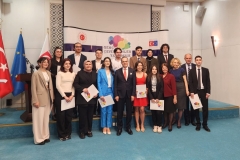
Young Translators from İzmir University of Economics Received Their Awards.
On April 16, 2024, in Ankara, the Directorate for EU Affairs hosted the Certificate Ceremony for the "Young Translators Competition," where 125
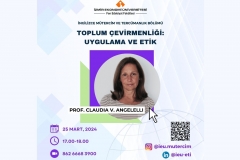
IUE Department of English Translation and Interpreting hosted Prof. Dr. Claudia V. Angelelli in the webinar titled "Community Interpreting: Practice and Ethics".
On Monday, March 25th, İzmir University of Economics Department of English Translation and Interpretation organized a webinar titled "Community Interpreting: Practice and
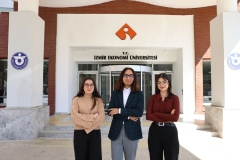
Returned to Izmir with three awards
The Young Translators Competition organized by the Ministry of Foreign Affairs Directorate for EU Affairs was marked by the success of Izmir
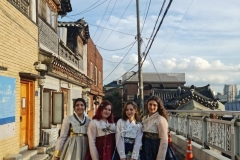
International agreements with 203 universities
Izmir University of Economics (IUE), who has signed international agreements with 203 universities with the aim of enhancing the educational opportunities offered
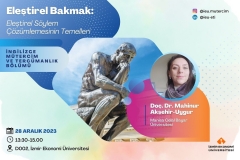
“Basics of Critical Discourse Analysis" Seminar at IUE English Translation and Interpreting Department
Izmir University of Economics, Department of English Translation and Interpreting, organized a seminar titled " Turning a Critical Eye: Basics of Critical
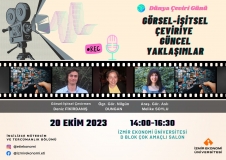
Within the framework of International Translation Day, IUE Department of English Translation and Interpreting, Faculty of Arts and Sciences, organized a panel titled "Current Approaches in Audiovisual Translation".
Within the framework of International Translation Day (September 30th), the Department of English Translation and Interpreting at Izmir University of Economics hosted
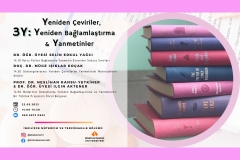
“Re-translations, Re-contextualization, and Paratexts” Panel at IUE English Translation and Interpreting Department
Izmir University of Economics, Faculty of Arts and Sciences, Department of English Translation and Interpreting organized an online panel titled "Re-translations, Re-contextualization,
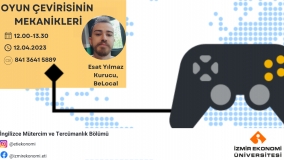
As part of the webinar series, IUE Department of English Translation and Interpreting, Faculty of Arts and Sciences, hosted Esat Yılmaz
IUE Department of English Translation and Interpreting, Faculty of Arts and Sciences, hosted Esat Yılmaz, the founder of a localization company, in



